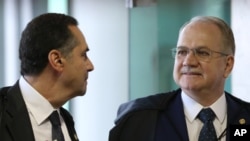Brazil's Supreme Court handed embattled President Dilma Rousseff two victories on Thursday in rulings that improve her chances of blocking an impeachment bid.
The judges voted to give the Senate the authority to review the grounds for the leftist leader's impeachment even if the lower house votes to impeach her for allegedly breaching budget laws last year.
A majority of the court also ruled against the validity of a secret lower-house ballot last week that stacked an impeachment committee with her opponents, forcing the selection of its members to be redone with an open vote.
Rousseff's opponents argued that the Senate must automatically suspend the president and begin a trial as soon as the lower house votes by a two-thirds majority to proceed with the impeachment. A trial could last six months.
The president stands a better chance of blocking impeachment in the Senate, her last line of defense.
The Supreme Court also agreed the Senate can admit or reject impeachment by a simple majority, rather than a two-thirds majority, potentially making it easier for Rousseff to have a proceeding thrown out.
Delays could be costly
Most observers think the president can at present muster the 171 lower-house votes needed to quash the impeachment proceedings. But they warn that delays in the process could see the president lose support amid a worsening economic downturn, a graft investigation targeting her ruling coalition, and a growing rift with her main political ally.
The impeachment was launched December 2 by Rousseff's bitter political foe, the speaker of the lower house, Eduardo Cunha. He took up allegations by opposition parties that she broke budget laws to increase spending during her 2014 re-election campaign.
Cunha, who is himself under pressure because of corruption charges and calls for his resignation, held the secret ballot so coalition lawmakers could vote freely to put Rousseff opponents on the committee.
"Cunha changed the rules in the middle of the game," said Justice Luis Roberto Barroso, who led the majority vote against the secret ballot. "He was losing so he took the ball home."
While it considered its decision, the Supreme Court had suspended the impeachment process. All but three of the tribunal's justices were appointed since the Workers' Party took office in 2003.
The impeachment has widened divisions within the fractious Brazilian Democratic Movement Party (PMDB), Rousseff's largest coalition ally, where a growing number of members want to break away from her government and many back her impeachment.
Corruption probe
The split between the PMDB and Rousseff's Workers' Party has added to political turmoil caused by a massive corruption investigation of dozens of politicians, mainly members of the governing coalition, as the country sinks into the deepest recession since the early 1990s.
The crisis has heightened distrust between Rousseff and her vice president, Michel Temer, leader of the PMDB and the man who would replace her if she is removed from office.
In a newspaper interview published Thursday, Temer dismissed charges by Rousseff's aides that he was conspiring behind the president's back, though his party is split down the middle over supporting her.
"It really bothers me that they keep saying I am plotting against the president. I have never done that," Temer told the O Globo newspaper. He added, however, that the PMDB, the key pillar of Rousseff's government, is "sharply divided" over whether to impeach her.
Temer said he has resisted pressure from within the PMDB to bring forward to January from March a convention that could decide to break away from Rousseff's coalition, which would make it virtually impossible for her to govern.
The growing distance between the PMDB and Rousseff's leftist Workers' Party became evident when her civil aviation minister, Eliseu Padilha, resigned from her cabinet on December 4, reducing to six the number of PMDB ministers, and raising speculation that Temer was positioning himself for a break.
Temer has not publicly stated his position on the impeachment, and it is not clear which way a majority of his party's members will vote in Congress.





